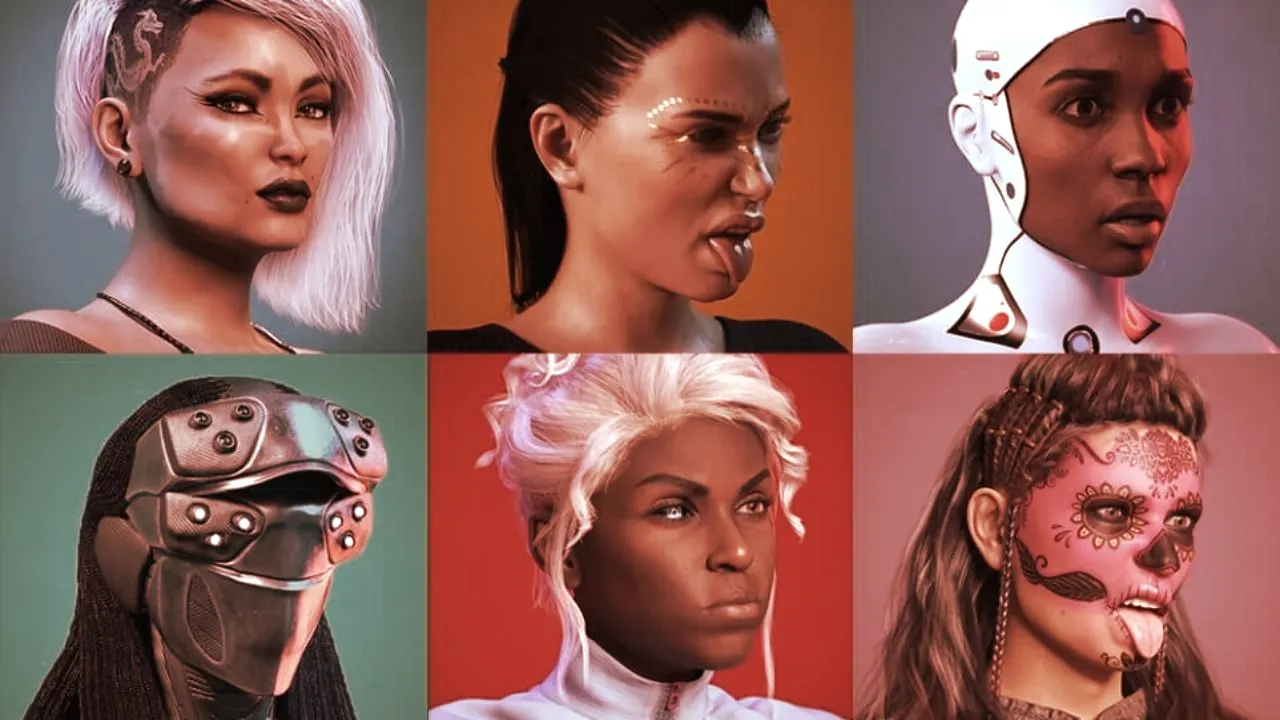The metaverse has shot to the forefront of the popular consciousness in recent months, as brands and celebrities have seized on the possibilities of the embryonic shared virtual world.
But while Mark Zuckerberg's Meta touts the possibilities of strutting around as a virtual representation of our best selves, the metaverse also raises thorny questions. In mixed or virtual reality, where identity both reflects and determines social capital, avatar NFTs (aka PFPs) pose ethical challenges around gender and race representation, and provoke questions about whether they have true utility or are just a thinly veiled flex.
An investor and developer demographic that skews mostly male and mainly White translates into a market that favors PFPs most representative of those who are snapping up these high-status assets; female Cryptopunks and those with darker skin tend to sell for less than avatars with male traits or fair skin, while female and dark-skinned Meebits appear to be less in-demand than white males. This threatens to upend any idea of a metaversal utopia even as the industry has rapidly advanced throughout 2021.
But it doesn’t have to be that way, according to the team at Daz3D, a 20-year-old 3D marketplace and software design studio that specializes in humanoid and avatar tech, and boasts clients such as Champion and Coca Cola. They've created Non-Fungible People (minting now at nfp.daz3d.com), a 3D-rendered NFT series that addresses gender representation with female and non-binary avatars, each of which also comes loaded with bags of functionality.
Righting the apple cart
The 8,888 algorithmically generated PFPs enjoy the same famed utility as the recent RTFKT collection, CloneX, which relied on Daz3D as a collaborator; each Non-Fungible Person PFP can be exported to popular game engines like Unity and Unreal, and is a customizable full-body model. “You can animate it, you can build video games around it, [and] you can take it into virtual worlds,” said Ty Duperron, the company’s chief operating officer, on a futuristic Zoom call with Decrypt where he showed up as an animated Bored Ape.
Females account for just 16% of the NFT art market, according to a report published by research firm ArtTactic in November, based on data from marketplace sales. The Non-Fungible People collection is centered firmly on female and non-binary forms to counteract the male-heavy character depictions prevalent in NFT collections, said Duperron.
“We wanted to appeal to collectors that maybe didn't feel like they had a place but we also wanted to bring in our creator community, our Daz Studio users,” he said.
The team was also inspired by the community response to collections such as Fame Lady Squad, an NFT project that was outed as being run by male devs who'd co-opted the language of diversity; today it’s controlled by its community and has a female lead.
Towards a multi-gendered metaverse
Creating and selling avatars is big business. By the second quarter of 2021, popular PFP projects like Bored Ape Yacht Club (BAYC) and Meebits had become key in keeping the NFT market afloat, and even mainstream auction house Christie’s has a sale focusing exclusively on PFPs.
Meanwhile, the fashion world has enthusiastically adopted the metaverse, leading to rich collaborations with NFT and gaming developers; avatar creators, and brands—all for the benefit of a savvy Gen Z demographic more demanding of diversity than their predecessors.
The need to establish diversity as a founding principle of the metaverse as it begins to gain traction is central to the Non-Fungible People project. It features a female-centric developer team and artists, and a percentage of NFT sales go to charities focusing on female representation in tech, with community members voting on this and other factors.
The project is also at the vanguard of the changing demographic make-up in the broader crypto space. Polls indicate that men are twice as likely as women to invest in cryptocurrency, but according to crypto exchange Gemini’s 2021 State of UK Crypto report, this gap is already beginning to close.
And there are tantalizing glimpses of what may be achievable, such as data to suggest that taking on an alternate metaverse persona can lead to a reduction in implicit bias.
“It opens up a world of possibilities where people can choose how they want to be seen,” Jessica Rizzuto, SVP of eCommerce at Daz3D, told Decrypt. “It's a fun way to be able to show people different sides of your personality, or maybe the opposite of your personality,” and the value of being part of a safe, like-minded community is amplified for minorities, she added.
As well RTFKT, Daz3D is working with other collection designers, “to bring these NFTs out of just being a singular image, but into other environments and spaces and experiences,” said Rizzuto.
The metaverse is waiting to be peopled with our digital selves, and the opportunity is there for the taking; if other design studios choose not to engage in the emerging conversation around representation in this unique arena, the risk is that we could amplify many of the problems around race, gender, and respect that we face IRL.
Non-Fungible People is minting now at nfp.daz3d.com.
Daily Debrief Newsletter
Start every day with the top news stories right now, plus original features, a podcast, videos and more.

